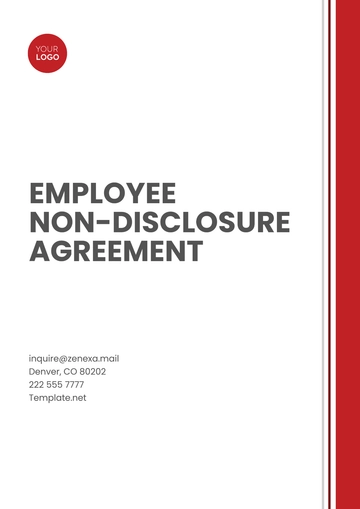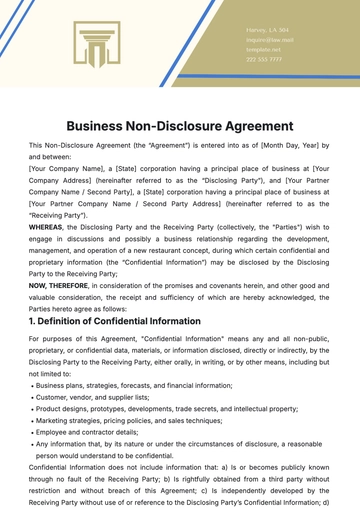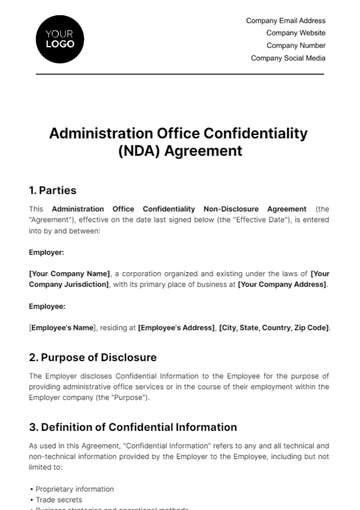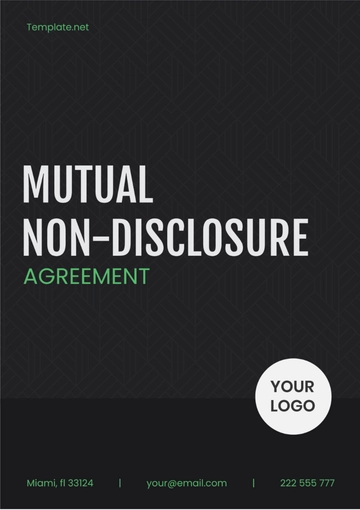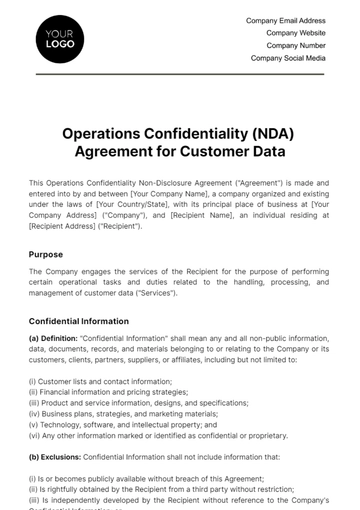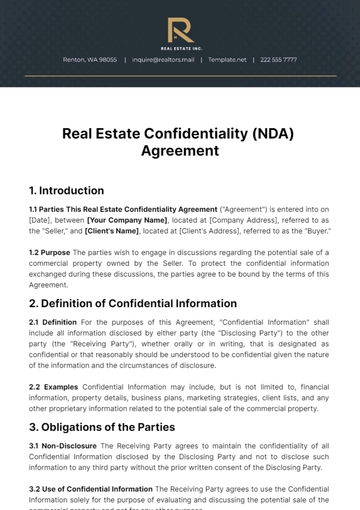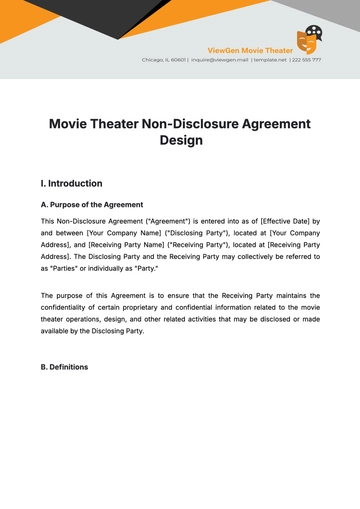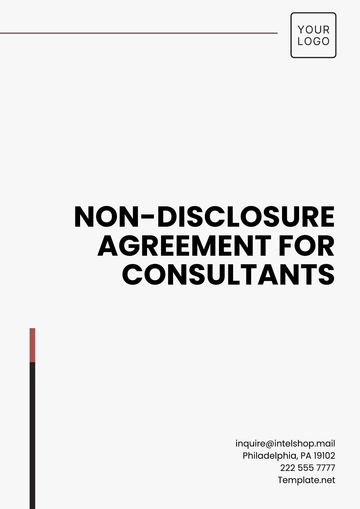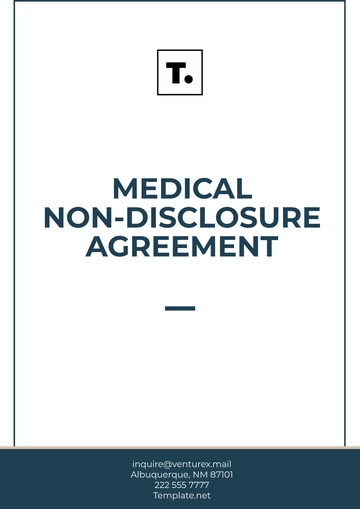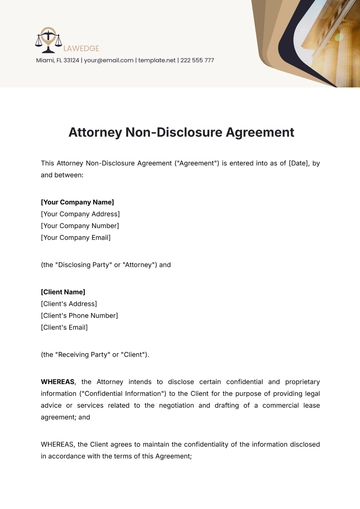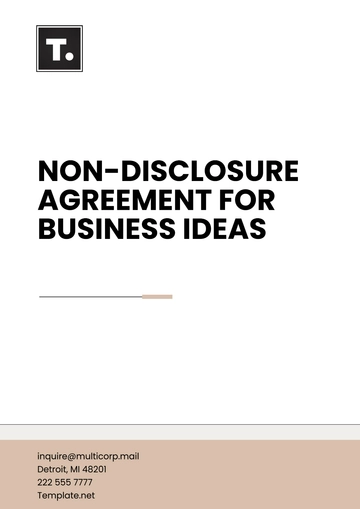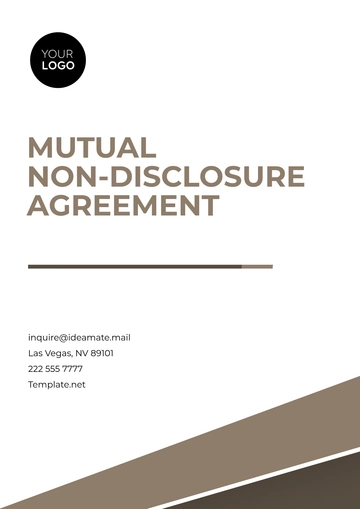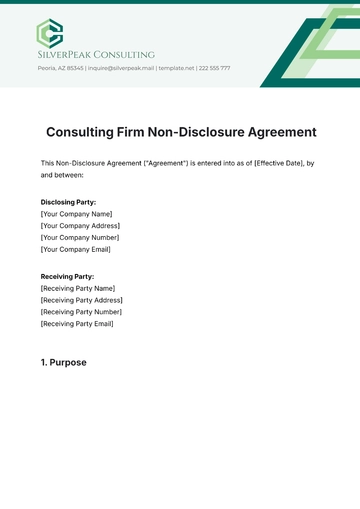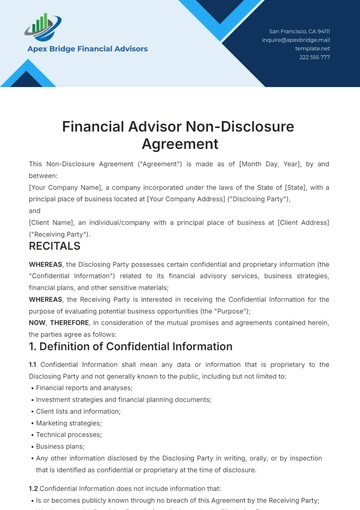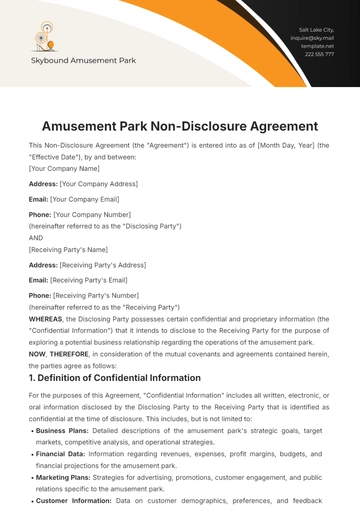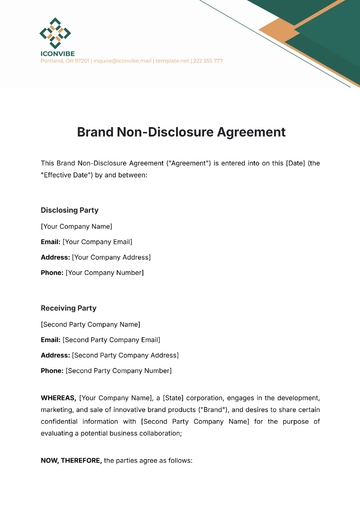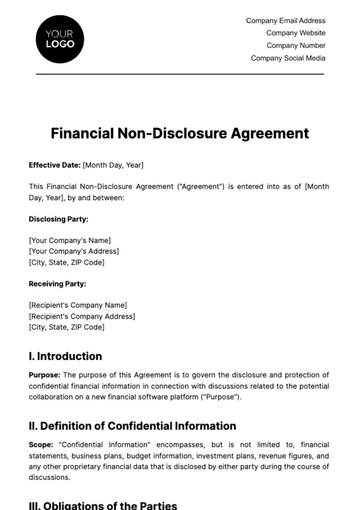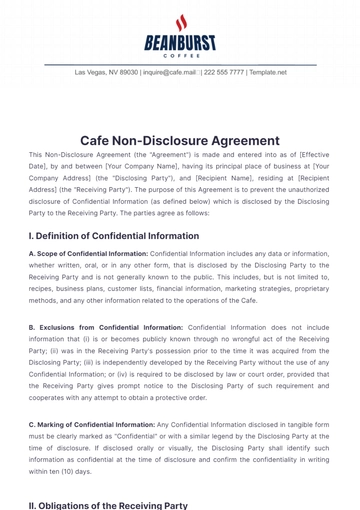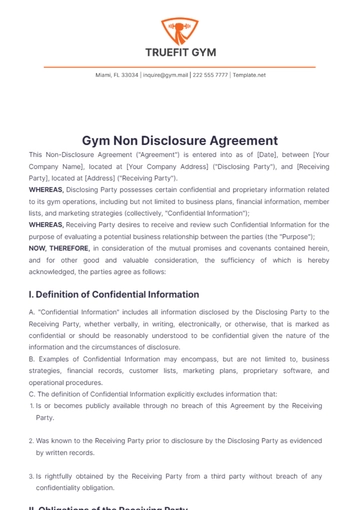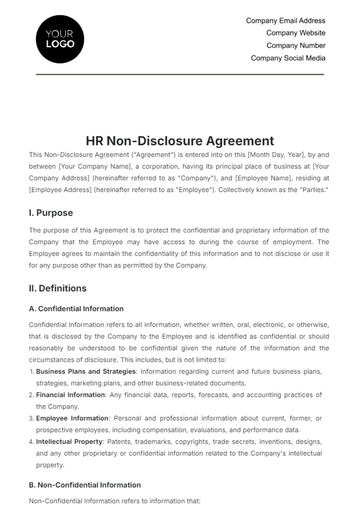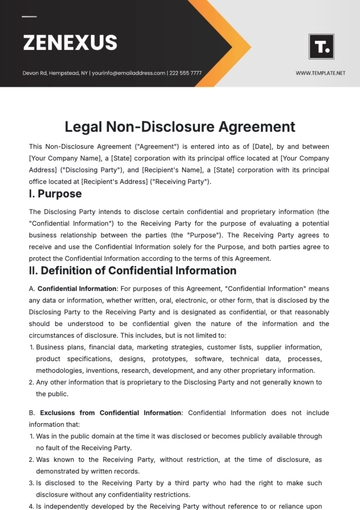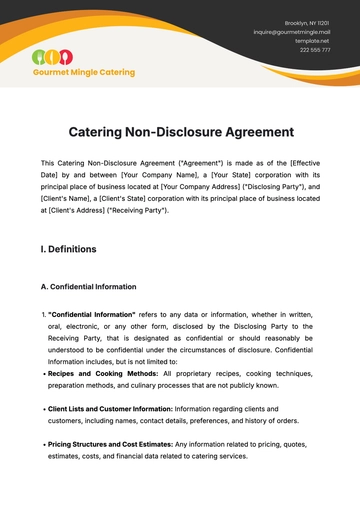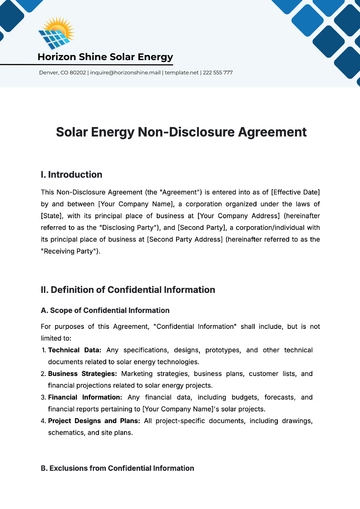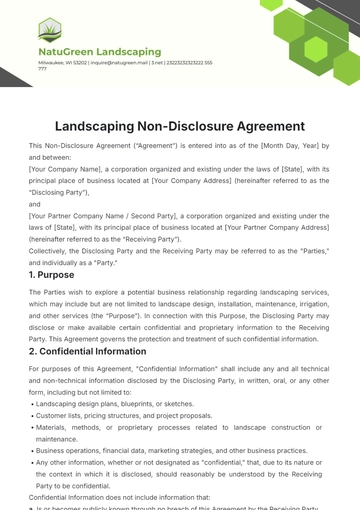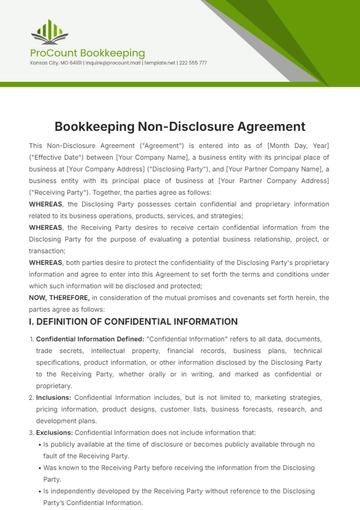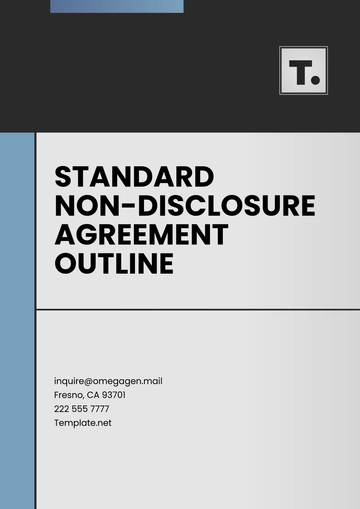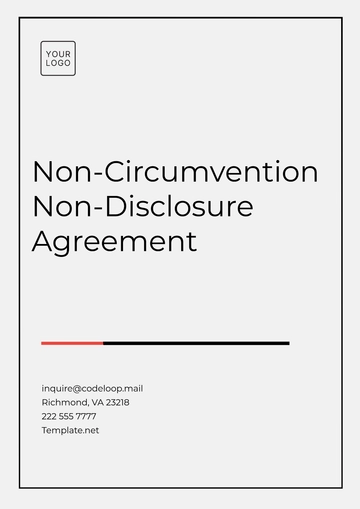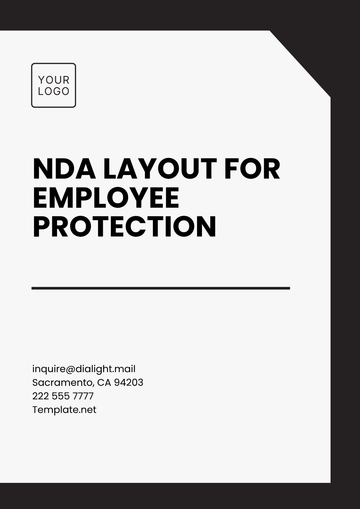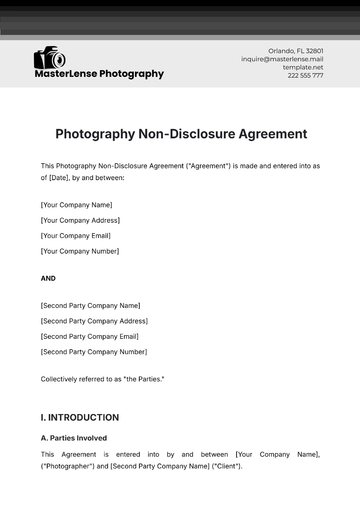Free Travel Agency Non-Disclosure Agreement
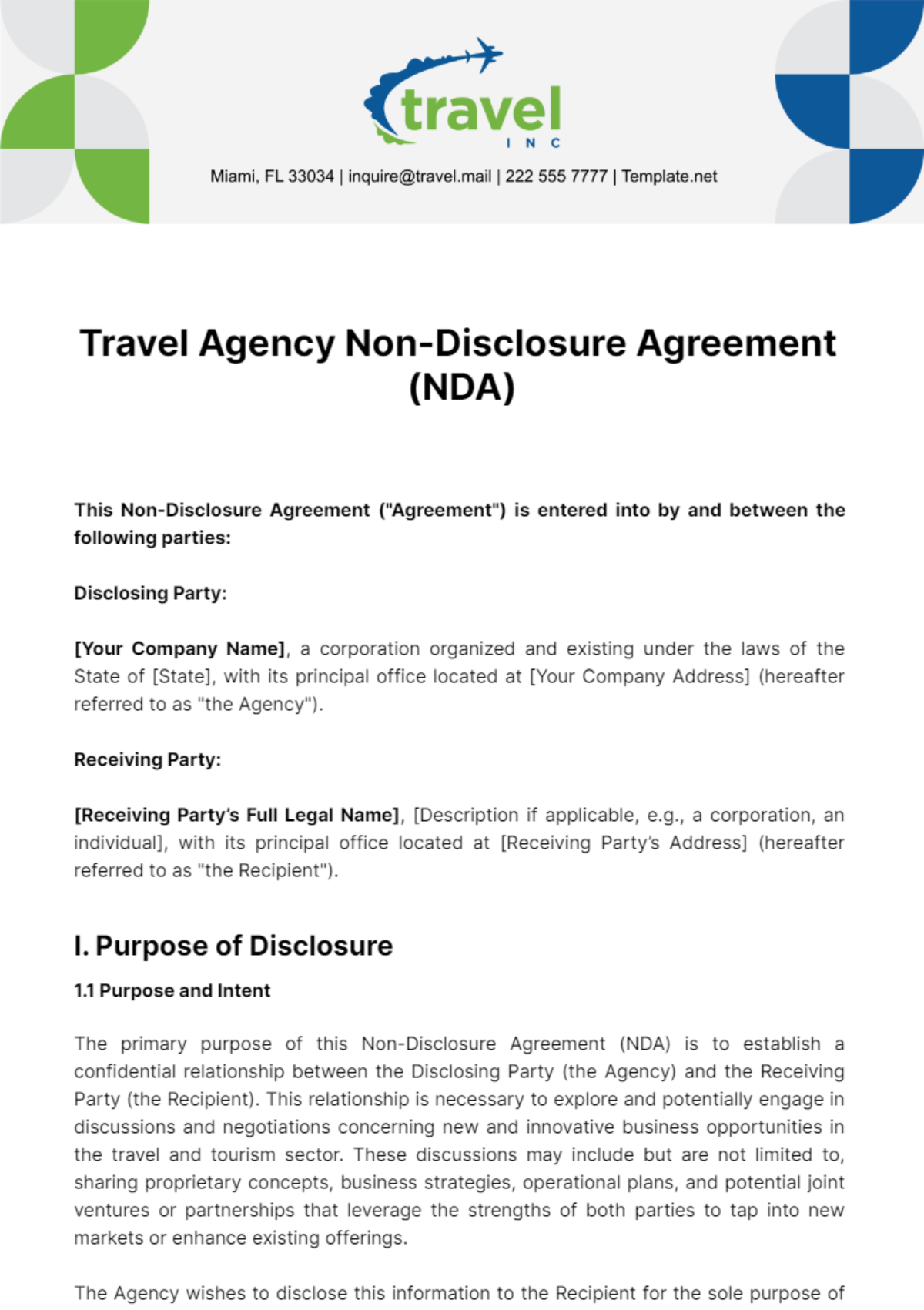
This Non-Disclosure Agreement ("Agreement") is entered into by and between the following parties:
Disclosing Party:
[Your Company Name], a corporation organized and existing under the laws of the State of [State], with its principal office located at [Your Company Address] (hereafter referred to as "the Agency").
Receiving Party:
[Receiving Party’s Full Legal Name], [Description if applicable, e.g., a corporation, an individual], with its principal office located at [Receiving Party’s Address] (hereafter referred to as "the Recipient").
I. Purpose of Disclosure
1.1 Purpose and Intent
The primary purpose of this Non-Disclosure Agreement (NDA) is to establish a confidential relationship between the Disclosing Party (the Agency) and the Receiving Party (the Recipient). This relationship is necessary to explore and potentially engage in discussions and negotiations concerning new and innovative business opportunities in the travel and tourism sector. These discussions may include but are not limited to, sharing proprietary concepts, business strategies, operational plans, and potential joint ventures or partnerships that leverage the strengths of both parties to tap into new markets or enhance existing offerings.
The Agency wishes to disclose this information to the Recipient for the sole purpose of evaluating or enhancing these potential business opportunities. Both parties acknowledge the sensitive nature of the information exchanged and recognize the necessity of protecting such information to preserve its value and prevent any potential competitive harm.
II. Definition of Confidential Information
2.1 Scope of Confidential Information
Confidential Information, for the purposes of this Agreement, is broadly defined to encompass various forms of data and intellectual property that are proprietary to the Agency. This includes, but is not limited to:
Technical Information: Product specifications, designs, drawings, processes, methods, and computer programs.
Business Information: Business and marketing plans, strategies, forecasts, projects, and customer lists.
Financial Information: Sales data, pricing structures, financial projections, and investment opportunities.
Operational Information: Internal workflows, procedures, tactics, and strategic plans.
2.2 Identification of Oral Confidential Information
Any Confidential Information transmitted orally must be documented and designated as confidential within thirty days of its disclosure. This requirement is to ensure that all pertinent data shared in meetings, conversations, or other verbal communications is afforded the same level of protection as written Confidential Information.
III. Obligations and Restrictions
3.1 Confidentiality Obligations
The Recipient agrees to:
3.1.1 Non-Disclosure
Maintain all Confidential Information in strict confidence and not disclose it to any third party without the express written consent of the Agency. This includes avoiding discussions of the Confidential Information in public or vulnerable digital platforms where unauthorized individuals might intercept the information.
3.1.2 Restricted Use
Use the Confidential Information solely for the purpose of evaluating or pursuing the outlined business opportunities. The Recipient must not use the Confidential Information for any other purpose, including personal gain or detriment to the Agency.
3.1.3 Controlled Access
Limit access to Confidential Information to personnel within the Recipient’s organization who have a clear need to know such information and who are themselves bound by confidentiality obligations that are at least as protective as those set out in this Agreement.
3.1.4 Safeguarding Measures
Implement and maintain robust security measures to protect Confidential Information from unauthorized access, disclosure, theft, or destruction. This includes physical security of documents and secure electronic storage with appropriate encryption and access controls.
IV. Exceptions to Confidential Information
4.1 Exclusions from Confidentiality
The obligations of confidentiality shall not apply to information that:
4.1.1 Public Knowledge
Becomes part of the public domain through no action or omission of the Recipient.
4.1.2 Independently Developed
Is independently developed by the Recipient without the use of or reference to the Agency’s Confidential Information.
4.1.3 Third-Party Information
Is lawfully received from a third party without restriction and without breach of this or any other NDA.
4.1.4 Legal Disclosure
Is disclosed in response to a valid order of a court or other governmental body or as otherwise required by law, provided that the Recipient shall provide prior written notice to the Agency to contest such order or requirement.
V. Term and Termination
5.1 Duration of the Agreement
This Agreement shall commence on the date first written below and will continue until the Confidential Information no longer qualifies as confidential or until the Agreement is terminated by either party with thirty days' written notice. However, the obligation to maintain the confidentiality of the Confidential Information shall survive the termination of this Agreement and remain in effect indefinitely.
VI. Governing Law
6.1 Jurisdiction and Enforcement
This Agreement shall be governed by and construed in accordance with the laws of the State of [State], regardless of conflicts of laws principles. Both parties agree that any legal action arising from or related to this Agreement shall be filed exclusively in the courts of [State].
This expanded content not only details the operational clauses but also ensures clarity and enforceability, providing both parties with a comprehensive understanding of their rights and responsibilities under this Non-Disclosure Agreement.
VII. Signatures
IN WITNESS WHEREOF, the parties hereto have executed this Non-Disclosure Agreement as of the last date written below.
[Your Company Name]
By:
![]()
Name:
Title:
Date:
[Receiving Party’s Full Legal Name]
By:
![]()
Name:
Title:
Date:
- 100% Customizable, free editor
- Access 1 Million+ Templates, photo’s & graphics
- Download or share as a template
- Click and replace photos, graphics, text, backgrounds
- Resize, crop, AI write & more
- Access advanced editor
Safeguard your business interests with Template.net's Travel Agency Non-Disclosure Agreement (NDA) Template. This meticulously crafted document ensures confidentiality and protects sensitive information. Customize clauses and terms effortlessly with our AI editor tool. Securely share proprietary details with partners and employees, fostering trust and collaboration while safeguarding your agency's valuable assets in the competitive travel industry.
You may also like
- Lease Agreement
- Non Compete Agreement
- Rental Agreement
- Prenuptial Agreement
- Non Disclosure Agreement
- Operating Agreement
- Hold Harmless Agreement
- LLC Operating Agreement
- Arbitration Agreement
- Purchase Agreement
- Residential Lease Agreement
- Executive Agreement
- Confidentiality Agreement
- Contractor Agreement
- Partnership Agreement
- Postnuptial Agreement
- Collective Bargaining Agreement
- Loan Agreement
- Roommate Agreement
- Commercial Lease Agreement
- Separation Agreement
- Cohabitation Agreement
- Room Rental Agreement
- Child Custody Agreement
- Employee Agreement
- License Agreements
- Settlement Agreement
- Joint Venture Agreement
- Indemnity Agreement
- Subordination Agreement
- Sales Agreement
- Agreements Between Two Parties
- Business Agreement
- Real Estate Agreement
- HR Agreement
- Service Agreement
- Property Agreement
- Agreement Letter
- Restaurant Agreement
- Construction Agreement
- Finance Agreement
- Marketing Agreement
- Payment Agreement
- Investment Agreement
- Management Agreement
- Nonprofit Agreement
- Software Agreement
- Startup Agreement
- Agency Agreement
- Copyright Agreement
- Collaboration Agreement
- Reseller Agreement
- Car Rental Agreement
- Cleaning Services Agreement
- Consultant Agreement
- Deed Agreement
- Car Agreement
- Equipment Agreement
- Shares Agreement
- Data Sharing Agreement
- Advertising Agreement
- School Agreement
- Franchise Agreement
- Event Agreement
- Travel Agency Agreement
- Vehicle Agreement
- Board Resolution Agreement
- Land Agreement
- Binding Agreement
- Tenancy Agreement
- Exclusive Agreement
- Development Agreement
- Assignment Agreement
- Design Agreement
- Equity Agreement
- Mortgage Agreement
- Purchase and Sale Agreement
- Shareholder Agreement
- Vendor Agreement
- Royalty Agreement
- Vehicle Lease Agreement
- Hotel Agreement
- Tenant Agreement
- Artist Agreement
- Commission Agreement
- Consignment Agreement
- Debt Agreement
- Recruitment Agreement
- Training Agreement
- Transfer Agreement
- Apprenticeship Agreement
- IT and Software Agreement
- Referral Agreement
- Resolution Agreement
- Waiver Agreement
- Consent Agreement
- Partner Agreement
- Social Media Agreement
- Customer Agreement
- Credit Agreement
- Supply Agreement
- Agent Agreement
- Brand Agreement
- Law Firm Agreement
- Maintenance Agreement
- Mutual Agreement
- Retail Agreement
- Deposit Agreement
- Land Purchase Agreement
- Nursing Home Agreement
- Supplier Agreement
- Buy Sell Agreement
- Child Support Agreement
- Landlord Agreement
- Payment Plan Agreement
- Release Agreement
- Research Agreement
- Sponsorship Agreement
- Buyout Agreement
- Equipment Rental Agreement
- Farm Agreement
- Manufacturing Agreement
- Strategic Agreement
- Termination of Lease Agreement
- Compliance Agreement
- Family Agreement
- Interior Design Agreement
- Ownership Agreement
- Residential Lease Agreement
- Retainer Agreement
- Trade Agreement
- University Agreement
- Broker Agreement
- Dissolution Agreement
- Funding Agreement
- Hosting Agreement
- Investor Agreement
- Memorandum of Agreement
- Advisory Agreement
- Affiliate Agreement
- Freelancer Agreement
- Grant Agreement
- Master Service Agreement
- Parking Agreement
- Subscription Agreement
- Trust Agreement
- Cancellation Agreement
- Horse Agreement
- Influencer Agreement
- Membership Agreement
- Vacation Rental Agreement
- Wholesale Agreement
- Author Agreement
- Distributor Agreement
- Exchange Agreement
- Food Agreement
- Guarantee Agreement
- Installment Agreement
- Internship Agreement
- Music Agreement
- Severance Agreement
- Software Development Agreement
- Storage Agreement
- Facility Agreement
- Intercompany Agreement
- Lending Agreement
- Lodger Agreement
- Outsourcing Services Agreement
- Usage Agreement
- Assurance Agreement
- Photography Agreement
- Profit Sharing Agreement
- Relationship Agreement
- Rent To Own Agreement
- Repayment Agreement
- Volunteer Agreement
- Co Parenting Agreement
- HVAC Agreement
- Lawn Care Agreement
- SAAS Agreement
- Work from Home Agreement
- Coaching Agreement
- Protection Agreement
- Security Agreement
- Repair Agreement
- Agreements License

